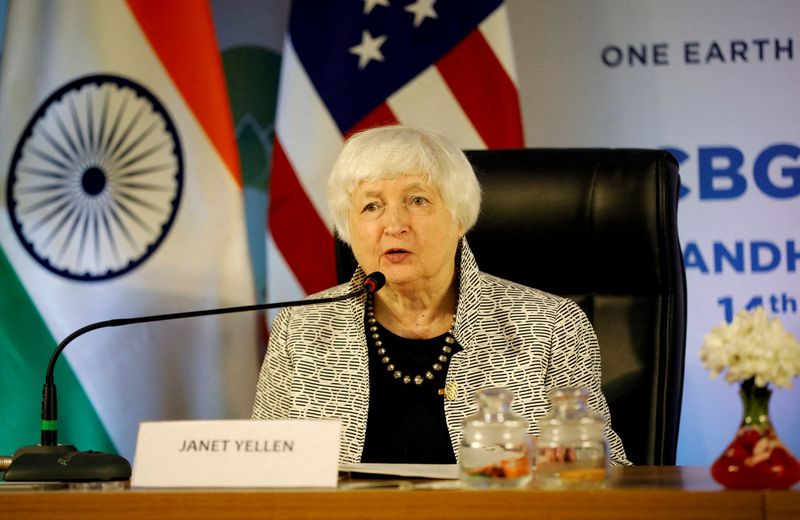Janet Yellen says she will press for IMF, World Bank resources at G20 summit

Janet Yellen says she will press for IMF, World Bank resources at G20 summit
U.S. Treasury Secretary Janet Yellen’s statements regarding her intentions at the G20 summit in India hold significant implications for international financial institutions and global economic stability. Yellen’s focus on increasing lending resources for the International Monetary Fund (IMF) and the World Bank underscores the urgency of addressing multiple global challenges, including economic crises exacerbated by the COVID-19 pandemic.
One key aspect of Yellen’s strategy is advocating for an “equi-proportional” increase in IMF quota funds paid-in by member countries. This approach aims to augment the IMF’s lending resources without an immediate overhaul of its shareholding structure. Essentially, it would allow the IMF to have more financial firepower to assist member countries facing economic hardships without altering the existing power dynamics among its member states.

The emphasis on maintaining the status quo in terms of shareholding and voting power within the IMF while increasing lending resources is a pragmatic approach. It recognizes that recalibrating the IMF’s shareholding formula to give more weight to emerging market economies like India, China, and Brazil is a complex process that may take time to negotiate among member countries.
The proposal to increase IMF quotas without immediately changing shareholding arrangements is in line with the idea that providing swift financial assistance to countries facing financial stress is a priority. It ensures that resources are made available promptly to address pressing economic challenges, particularly in the aftermath of the pandemic.
Yellen’s statements also indicate a commitment to multilateralism and international cooperation in addressing global economic issues. By seeking support from the G20, which represents a significant portion of the world’s economy, the United States aims to build a consensus on bolstering these international financial institutions to better respond to crises and support economic recovery efforts.
Overall, Yellen’s approach at the G20 summit signals a proactive stance in addressing the world’s economic challenges and underscores the importance of a coordinated global response to ensure financial stability and recovery in a post-pandemic world.
Secretary Janet Yellen’s announcement that the United States is seeking congressional permission to lend $21 billion to IMF trust funds, particularly for the benefit of the poorest countries, highlights the commitment of the U.S. government to support global economic stability and development. This allocation of funds to IMF trust funds is especially critical for impoverished nations grappling with economic challenges, as these resources can provide much-needed financial assistance to address immediate needs and foster long-term growth.
Yellen also emphasized the progress made by the World Bank and other multilateral development banks in expanding their lending resources. The expansion of lending resources is significant, not only for addressing immediate crises but also for tackling broader global challenges such as climate change, pandemics, and poverty alleviation. These institutions play a pivotal role in financing projects and initiatives that can have a profound impact on sustainable development and addressing pressing global issues.
The mention of near-term balance sheet changes that could unlock an additional $200 billion over the next decade underscores the importance of innovative financial strategies. These changes can help optimize the utilization of existing resources to provide more substantial support for countries in need. It’s a strategic approach that leverages financial mechanisms to increase the impact of available funds.
Furthermore, the consideration of medium-term steps recommended by a G20 capital adequacy review, including the use of callable capital, signifies a commitment to finding creative solutions to boost financial resources for international organizations. Callable capital, which is pledged but not paid-in, can effectively expand the capacity of these institutions to provide loans and assistance when required.
In summary, Secretary Janet Yellen’s remarks reflect a proactive approach by the United States in addressing global challenges through financial support to international institutions. These initiatives not only offer immediate relief to the most vulnerable nations but also contribute to long-term global economic stability, sustainable development, and the resilience needed to face a rapidly changing world.
Secretary Janet Yellen’s focus on crucial additional resources for addressing global challenges such as reducing poverty, advancing global health security, and combating climate change underscores the interconnected nature of today’s global issues. These resources are vital for implementing effective solutions and driving progress on multiple fronts, from alleviating poverty and improving healthcare infrastructure to mitigating the impact of climate change.
Yellen’s consistent emphasis on debt relief for poorer countries, especially in the presence of major lenders like China, highlights the pressing need for supporting economically vulnerable nations. Debt relief initiatives, including those under the G20’s Common Framework for Debt Treatment, play a critical role in providing stability and financial relief to countries facing overwhelming debt burdens. The slow progress in this area calls for renewed international efforts to ensure that these nations have the necessary financial breathing room to invest in their development and resilience.
Strengthening international support for Ukraine is another significant priority mentioned by Secretary Yellen. The economic assistance provided through initiatives like the IMF’s Ukraine loan program and the European Union’s support package is essential for the country’s stability and recovery, particularly in the face of ongoing geopolitical challenges.
Secretary Yellen’s call for support for the G20’s Global Agriculture and Food Security program and the UN’s International Fund for Agricultural Development underscores the importance of addressing food insecurity, especially in regions impacted by geopolitical decisions like Russia’s withdrawal from a grain deal. Ensuring access to reliable and sustainable food sources is crucial for global stability and well-being.
In summary, Secretary Yellen’s agenda at the G20 gathering reflects a commitment to addressing a wide range of global challenges, from economic stability and debt relief to food security and climate change. Her efforts exemplify the importance of international collaboration and financial support in navigating the complex issues facing the world today.




